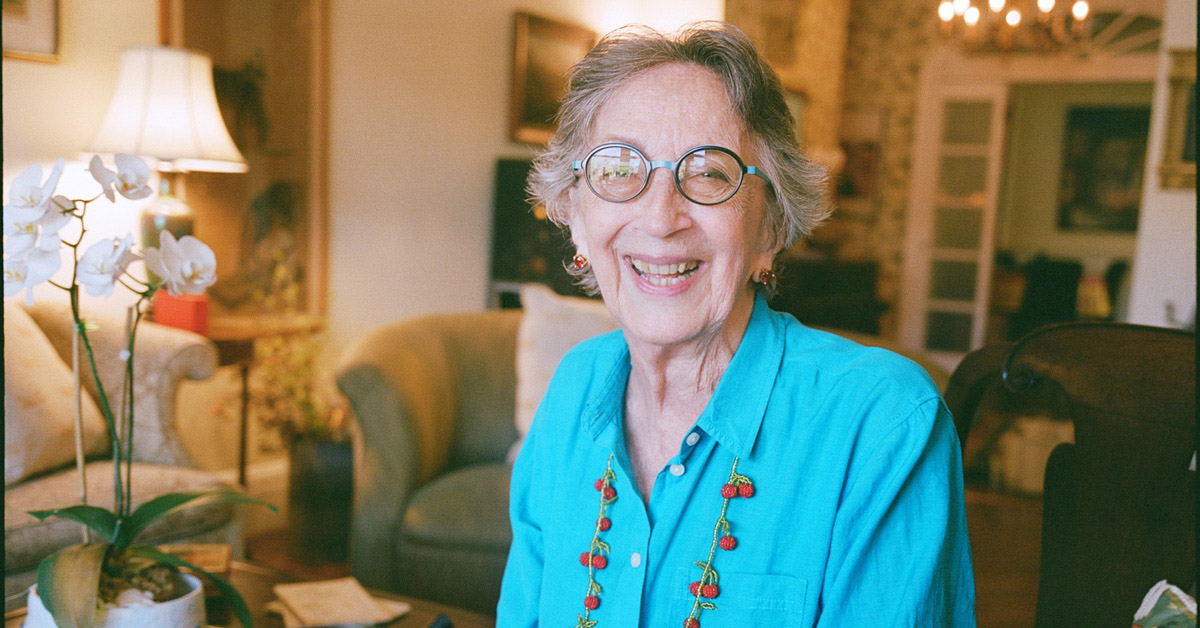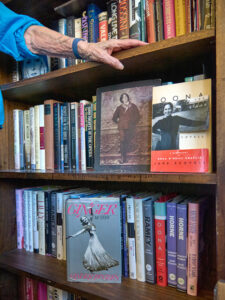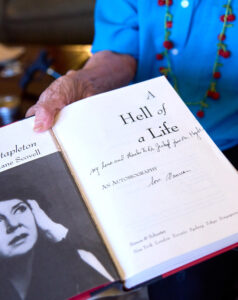Celebrity biographer Jane Scovell ’56 is finally ready to tell her story

She just released her 16th book, which she calls one of her “best”
By Scott Enman ’15
For 60 years, Jane Scovell ’56 has documented the lives of luminaries such as Elizabeth Taylor, Ginger Rogers, Kitty Dukakis, Tim Conway, Marilyn Horne and Maureen Stapleton, as well as written biographies of Charlie Chaplin’s wife Oona O’Neill, and opera singer Samuel Ramey. Four of her books were on The New York Times and Los Angeles Times Best Seller lists.
As a biographer, known mostly for collaboratively writing books with the subjects themselves, Scovell has told the stories of numerous people — but she’s yet to tell her own. Until now.
Fresh off the release of her 16th book, which she calls one her “best,” Scovell sat down with Wheaton magazine to reminisce about her life’s work and to reflect on her time at Wheaton and how it prepared her for a career in telling stories.
“Looking back, Wheaton was kind of idyllic. I have very strong and very fond memories, although I complained a lot,” she says, laughing. “I liked the smallness because you knew everybody. It had a stunning English department, really wonderful teachers. There was a great English teacher named Louise Barr MacKenzie. She taught Shakespeare, among other courses.
“Just before graduation, Mrs. Mackenzie invited me to lunch at the end of which she asked, ‘What are you going to take away from your years at Wheaton?’ And I answered, ‘Oh, all the wonderful friends I made.’ And she said, ‘Of course, but, maybe you’ll find out later, that some of the things you’ve learned will come into play, as well.’ Well — they sure did.”
After graduating in 1956, back when Wheaton was a women’s college, Scovell wore several different hats: journalist, author, teacher, wife and mother.
Her two passions were and still are opera and movies. “I enjoy life,” she says. “I’m crazy about movies, television, radio, theatre, ballet—anything that’s entertainment. Any opportunity, I would go to shows. When I was younger, I would stand at the opera just to get to see it. ”
Scovell was born in Brockton, Mass., a city known for producing boxing greats, including heavyweight champion Rocky Marciano, middleweight champion Marvin Hagler, and boxing referee Arthur Mercante.

“I could not hope to pursue a ring career so I decided to become an actress,” she says. “I soon learned that boxing is a far gentler profession than acting and retired from the stage—before stepping one foot on it. While attending graduate school at Columbia, I became a teacher, a more brutal profession, by the way, than the last two named.”
After swapping the stage for the classroom, she taught the history and appreciation of opera, as well as “Music in the Film.” It was while teaching that she discovered her calling as a writer.
After graduate school, she moved to Boston, where she produced a column, Plain Jane, in the Boston Herald, wrote for the Boston Globe and Boston Magazine, was part of the small ensemble cast of the WGBH TV show “Hub City Hot Shots,” and taught at Beaver Country Day School, Pine Manor Junior College, Harvard’s Center for Lifelong Learning and Newton College of the Sacred Heart, which later merged with Boston College.
Though she spent her young adulthood in Massachusetts and returned there for 25 years after graduate school, she always wanted to live in New York City.
“I had made up my mind that I was going to get to New York,” she says. “I wanted to be here; this was the place. So the minute I graduated from Wheaton, I moved to Manhattan. In New York, you’re always at the scene; this city is just great. It shaped me in so many ways.”
Scovell, who lives on Manhattan’s Upper West Side, can routinely be found taking in a show at the Met Opera or Film Forum. When working on her books, she would rise at 4:30 a.m. to start writing, stop around noon, and go to the movies. When she experienced writer’s block, Scovell said she would watch films all day to clear her head.
Overlooking the Museum of Natural History, Scovell’s apartment might as well be an extension of the museum itself. The rooms, filled with trinkets, books and antique furniture, each have a story to tell. Tomes on the history of opera dot the shelves. A signed New Yorker cartoon from Ginger Rogers stands perched on a ledge. A grand piano sits waiting to be played.
Over the course of just 15 minutes, Scovell talks about a party she attended with Marilyn Horne after a Met Gala, about plays she appeared in as a Wheaton student, and a trip to Taunton that ended up with her and her friends having to spend the night in a YWCA room for unwed mothers after missing curfew.
At times and with certain words, her Boston accent sneaks out, though she says she suppresses it mostly. “I fake it here in New York,” she says, crediting her time spent at the Herbert Berghof Studio for teaching her to present her “Rs.”
Scovell reflects on life and offers sage advice all while pouring a cup of tea. She reaches back into her memory bank, remembering details as if they happened yesterday. She’s remarkably funny and quick to crack a joke.
“I love stories—people’s stories,” she says. “They’re fascinating, and you learn so much. All the books I’ve worked on, I found something in each of them that interested me. Everybody thinks they have a story to tell, and then there are those people who really have a story to tell.”
Scovell found her niche co-writing autobiographies serendipitously. A journalist friend, who had been working on a book with opera singer Marilyn Horne, couldn’t get enough money for the project, so Scovell volunteered to do it herself.
The timing couldn’t have been better. Horne had just had a major premiere at the Met Opera in Handel’s “Rinaldo.”
“My friend turned over all his material to me, and because of the Horne and Handel clout, I actually got more money than he did,” Scovell says with a wry smile. “That book really had a nice success.”
Soon after, Scovell was on to Elizabeth Taylor and eventually Maureen Stapleton.

While working with Stapleton, Scovell recalls always having to keep the actress’s libations stocked: “I was running wine back and forth from the package store and writing a book at the same time.”
She also remembers the interview process when she was a candidate to assist in Elizabeth Taylor’s autobiography. Sitting in Taylor’s suite in the Alrae Hotel, now The Mark, Scovell said they chatted for some time.
“I told her stories that I knew she’d like,” Scovell recalls. “And then at the end, we thanked each other, and Elizabeth stood up and ended the interview by remarking, ‘You know, it’s very easy to talk to you.’ ‘Well,’ I answered, ‘We did grow up together, albeit you were in Hollywood and I was in Brockton.’”
Aside from being easy to converse with, what has made Scovell so successful in her career, is her immense pride in being able to write in the voice of the people with whom she works.
“One of my editors told me I had a gift for capturing other people’s voices,” Scovell says. “To do that you have to keep yourself out of the picture. Don’t change what someone says, just listen, put it down and then edit judiciously.
“If you think differently, keep it to yourself. You just cannot impose yourself. You really have to step back. I can see funny things and funny situations, and I can set it up. At the same time, you have to be true and faithful to your subject. When you have something good, you can use it. But you have to keep your eyes and ears open a bit.”
At 90, Scovell is sharp, sprightly and still quite active. Just days before this interview, she returned from Vienna, where she was promoting her latest work, At Large: Behind the Camera with Brian Large.
The book documents the life of award-winning videographer and director Brian Large, who specializes in opera and classical music. In June, Scovell and Large celebrated their U.S. debut of the book at the Czech Center New York, and will do another launch in Prague, come September.
“This book really knocked my socks off,” she says. “I wasn’t expecting it. Brian’s British; he’s very different from me. He doesn’t swear. He has a wicked sense of humor, and he’s had the most fascinating life.
“As for me, how many people are still working at 90? It’s a good career, you know, if you last. And I still enjoy working. Creating a good sentence is a lot of fun, and nerve-wracking. I’m so happy and proud to bow out with what I consider one of the best books I’ve ever worked on. Now, I’m going to write my memoirs for my children and grandchildren.”
